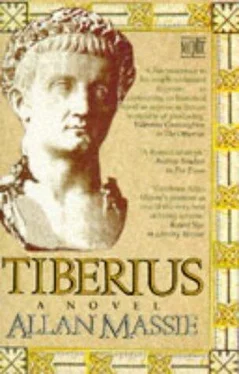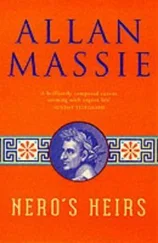Allan Massie - Tiberius
Здесь есть возможность читать онлайн «Allan Massie - Tiberius» весь текст электронной книги совершенно бесплатно (целиком полную версию без сокращений). В некоторых случаях можно слушать аудио, скачать через торрент в формате fb2 и присутствует краткое содержание. Жанр: Исторические приключения, на английском языке. Описание произведения, (предисловие) а так же отзывы посетителей доступны на портале библиотеки ЛибКат.
- Название:Tiberius
- Автор:
- Жанр:
- Год:неизвестен
- ISBN:нет данных
- Рейтинг книги:5 / 5. Голосов: 1
-
Избранное:Добавить в избранное
- Отзывы:
-
Ваша оценка:
- 100
- 1
- 2
- 3
- 4
- 5
Tiberius: краткое содержание, описание и аннотация
Предлагаем к чтению аннотацию, описание, краткое содержание или предисловие (зависит от того, что написал сам автор книги «Tiberius»). Если вы не нашли необходимую информацию о книге — напишите в комментариях, мы постараемся отыскать её.
Tiberius — читать онлайн бесплатно полную книгу (весь текст) целиком
Ниже представлен текст книги, разбитый по страницам. Система сохранения места последней прочитанной страницы, позволяет с удобством читать онлайн бесплатно книгу «Tiberius», без необходимости каждый раз заново искать на чём Вы остановились. Поставьте закладку, и сможете в любой момент перейти на страницу, на которой закончили чтение.
Интервал:
Закладка:
I was fascinated. This was a different Augustus I was seeing. I realised for the first time how my mother diminished him; in her presence he would never have dared speak as if he had authority. Men, I said to myself, become fully themselves when they are away from women: in the camp, at their office, feeling responsible for action, for decisions which determine life and death. But Marcellus was bored. He interrupted:
"Caesar invaded the island of Britain, didn't he?"
If I had interrupted in such a manner which showed that I had p aid no attention to what he had been saying, he would have r eproved me. But he beamed at Marcellus and laughed:
"You know he did. You've read his memoirs, haven't you..? "
Marcellus groaned.
"Not much of them. He's awfully dull, you know."
"I can see how you might think so," he stretched over and umpled my cousin's hair. "Is that your opinion too?" he asked.
"He's admirably lucid," I said, "and I've no experience of zourse, but I find his descriptions of battles very convincing, except for one thing. He's always the hero. Was he really like that, sir?"
He smiled at us, as if thinking. I nibbled a radish. Marcellus t ook a swig of wine. Then, before Augustus could speak, he said:
"I do like the sound of Britain, there are pearls there and the warriors paint themselves blue. They must look funny, but despite that, it seems they can f ight a bit. Why don't we carry o n Caesar's work and conquer the island?"
"What do you think, Tiberius…?"
I hesitated, to show that my op inion was well considered. But I had no doubt:
"It seems to me that we have enough trouble with the empire as it is. I think it may be big enough. Wouldn't we be best to consolidate before we bite off any more…?"
And what was Marcellus' reaction to this good sense?
He called me an old woman. If we'd been alone I might have said that it was better to talk like an old woman than a silly girl, but in the circumstances I only smiled.
To my surprise, Augustus agreed with me.
"Caesar was an adventurer," he said. "I'm not. The conquest of Britain would be worthless, for the island is covered in fog and there's little evidence that the pearl fisheries are of much value.. "
Marcellus sighed. "It would be such an adventure," and Augustus laughed and rumpled his hair again.
2
Augustus was from the first, by nature, a dynast. The word is Greek and means a man of power. It was on account of his single-minded pursuit of power that he triumphed in the civil wars; it was that pursuit which forced the war against Antony and Cleopatra on the Roman people. Yet he was never even a competent soldier. He owed his victories to Marcus Agrippa, and to the goddess Fortune.
I didn't appreciate Agrippa till he became my father-in-law. I can't reproach myself for failing to do so. It would have been more remarkable if I had understood his genius, for he was everything I distrusted by nature: rough, uncouth, with a strong provincial accent, and given to laughing loudly at his own (poor) jokes. He had that taste for bawdy stories which is such a useful means of creating good-feeling between men; it is my ill-fortune that I am fastidious and detest such ribaldry.
Augustus relied on him utterly. They were complementary. Neither would have been capable of the other's achievement. Nevertheless, as children, we used to mock him, Julia especially. I didn't realise then that Augustus had already arranged that I should marry Agrippa's daughter, Vipsania. I would have been extremely offended, for I found her insipid.
Certain scenes of youth stand out with the clarity of wall-paintings. A summer evening in the gardens of a villa overlooking the sea, Naples some twenty miles distant. I am reading Homer and listening to a nightingale, for it is almost too dark to read the words. A hand is slipped across my eyes from the rear. I have heard no one approaching. The hand is cool and dry.
"Julia," I say, without moving, and feel the fingers move down to stroke my cheek.
"I wish you weren't always reading. I don't know what you see in books."
"They tell us," I say, "how life…"
"Now, darling," she says, "don't be pompous…"
Even at that age — what, thirteen? — when most of us are shy and awkwardly aware of ourselves, Julia could employ the word "darling" as naturally as a child or a lover.
But she was perturbed that summer, that evening.
"Put your book away," she said. "I want to speak to you."
"Well, it's too dark to read…"
"Please be serious."
"What is this? You ask me to be serious?" "I've got some news. Daddy says he wants me to marry The Hyacinth." "Congratulations." "Don't be silly."
"I'm serious. Marcellus is going to win great glory. Your father will see to that…"
"That's what I mean. I should prefer my husband to be a man who will win glory for himself. Or perhaps not? What is glory after all?"
"But Marcellus is charming also," I said. "Everyone agrees on that."
"Oh yes," she said, "but I don't want him…" She leaned forward, kissed me on the lips, and ran away, laughing.
She would laugh — at intervals — all through her marriage to Marcellus, and he took it as a tribute to his charms. But laughter in Julia was not necessarily a sign of happiness.
As it happened, my mother also was opposed to the marriage. She made her view clear, but this was one of the few battles with Augustus which she lost.
"He was besotted with the boy," she told me later. "It blinded his judgment and made him obstinate as a pig."
Curiously, Marcellus' own mother, Augustus' sister, Octavia, also disapproved of the marriage. She feared that it would expose her son to the jealousy of more capable and more ruthless men.
She knew he was a lightweight, even if she adored him. Indeed it is quite possible that Marcellus commanded the adoration of his mother and uncle precisely for that reason.
Nevertheless the marriage went ahead. Augustus was silly with joy. Marcellus preened himself. Julia sulked. She soon found however that there was something to be said for her new state. As a married woman she had privileges denied a virgin. She had her own household and discovered that she enjoyed the freedom and the opportunities to command which this afforded her.
But she was not happy and she had reason for discontent. One evening she invited me to supper. I was surprised to discover that we were alone together.
"Don't be silly, my old bear," she said. "After all we're practically brother and sister."
She toyed with her food, nibbling a little dried fish and some green grapes, a slice of smoked ham and two purple figs, which she held up between thumb and forefinger before putting them whole into her mouth. She drank two or three goblets of wine, and urged me on. Then she dismissed the slaves and we were alone.
She stretched out on her couch, holding up her arm to admire the shape of her hand, and let me have a glimpse of her breasts. She pulled up the skirts of her gown to display her legs.
"They're improving, aren't they?" she said. "Only a few weeks ago they were still fat. What do you think of them, old bear?"
"Stop it," I said.
"Why?"
"Because it's not right…"
"It's not my fault if I fancy you and not my husband. Is it now?"
She stroked her thighs and smiled.
"Cat," I said; but didn't move.
"Old bear. Are you a virgin, old bear?"
I'm sure I blushed.
"As a matter of fact, no," I said.
"Oh good. The Hyacinth can't do it," she said, "not with me anyway. I think he needs people to tell him how pretty he is, and I won't do that. Do you know where he is tonight, actually…?"
I shook my head. I couldn't take my eyes off her legs and the movement of her hands…
Читать дальшеИнтервал:
Закладка:
Похожие книги на «Tiberius»
Представляем Вашему вниманию похожие книги на «Tiberius» списком для выбора. Мы отобрали схожую по названию и смыслу литературу в надежде предоставить читателям больше вариантов отыскать новые, интересные, ещё непрочитанные произведения.
Обсуждение, отзывы о книге «Tiberius» и просто собственные мнения читателей. Оставьте ваши комментарии, напишите, что Вы думаете о произведении, его смысле или главных героях. Укажите что конкретно понравилось, а что нет, и почему Вы так считаете.












